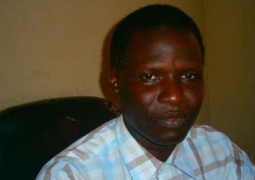Dr. Aja Isatou Njie- Saidy, the Vice-President and Minister of Women's Affairs who is also the Chairperson of the National Disaster Management Governing Council has emphasised The Gambia Government's high political commitment to Disaster Management and Risk Reduction (DMRR).
Vice-President Njie-Saidy made this statement last week during the two-day validation workshop for the Establishment and Strengthening of Model National Platforms for Disaster Risk Management in the
She said the Gambia National Disaster Management Governing Council comprises of the Ministers from the relevant sectors, the private sectors represented by the GCC and TANGO representing the NGO affairs and civil society groups in The
Madam Njie-Saidy said the rational for highlighting this was to show the high political commitment to Disaster Management and Risk Reduction by the Government of the
The overarching goal of a Model National Platform for Disaster Risk Management, she went on is to effectively contribute to its functional in the building of the country's resilience to disaster and other emergencies for the sake of sustainable development.
This Madam Njie-Saidy went on is to achieved the following key objectives: to serve as a co-ordination mechanism to enhance multi-stakeholder collaboration and co-ordination for the sustainability of Disaster Risk Management activities through a consultative and participatory process in line with the implementation of the ECOWAS Policy Emergency Response Tools and the Hyogo Framework for Action HFA, to foster an enabling environment for developing a culture of prevention, preparedness, mitigation and response through advocacy and awareness-raising on DRM and the necessity and important of integrating Disaster Risk Management into development policies, planning and programmes and to facilitate the integration of DRM into national policies, planning and programmes in various development sectors as well as into international or bilateral development aid policies and programmes.
Vice-President Njie-Saidy informed the ECOWAS delegates that the National Disaster Governing Council of the
She said without the requisite political commitment at the highest level supported with adequate budgetary provisions, the success of the DRR interventions at the National level would remain an illusion.
VP Njie- Saidy said it is important to have political commitment but that commitment must not stop at the level of mere rhetoric but should be translated into concrete actions to advance the HFA agenda. "Political commitment must be reflected in true support for disaster reduction Governance by developing the necessary institutional framework and the appropriate structures at the National and decentralise levels," VP Njie-Saidy asserted. Madam Njie-Saidy also emphasised that an important element of a comprehensive NDM structure is the establishment and developing of a multi-stakeholder National Platform, stating that DRM should be seen as a development imperative and priority as it supports the achievement of development and that the PRSP also supports the MDGs implementation goals as well.
She also informed the ECOWAS delegates that The Gambia have developed the NDM policy for a four year strategic action plan and DM legislation that has provided the structures at the National, Regional and Local levels to facilitate the operationalisation of the institutional DRM framework.
Madam Njie-Saidy called on the ECOWAS Member States to urgently mainstream DRR into their National Planing agendas, their PRSPs and of course the UN Development Assistance Framework UNDAF.
This mainstreaming or integration Madam Njie-Sadiy went on will ensure that development and poverty reduction gains are not eroded by natural and human instigated calamities. VP Njie-Saidy told delegates that
In his welcoming address on behalf of the President of the ECOWAS Commission, His Excellency Ambassador Victor Gbeho, Dr. Daniel Eklu, Director, Humanitarian and Social Affairs ECOWAS Commission said it was a very important workshop to validate the ECOWAS Draft Guidelines for the Establishment and Strengthening of the National Platform for Disaster Risk Management DRM in
Dr. Eklu said the increasing occurrence and severity of disaster whether natural or man-made have no doubt constituted negative impact on the economic and social development of the West African Region. In 2009 Dr. Eklu went on, all the 15 countries in West Africa experienced serious floods in the region and several people and communities were displaced and lost their means of livelihoods .He added that weather forecast, climatologist and disaster risk experts have sent a warning signal to expect more torrential rain fall in 2010. He said ECOWAS Commission would continue to show interest in increasing the development of a mechanism to co-ordinate and collaborate with the member states and relevant institutions on issues related to emergency preparedness, prevention, mitigation and response.
Dr. Eklu said that in order to reduce the impact of natural and man-made disasters including humanitarian crisis in
According to Dr. Eklu EERT mechanism is a tool for achieving ECOWAS objectives in the area of delivery and co-ordination of humanitarian response in the sub-region.
He said ECOWAS Commission is strongly convinced that the starting point for reducing the impact of natural and man-made disasters in the sub-region lies in having functional and co-ordinated National Platforms at the national and Regional levels.
Dr. Eklu finally told ECOWAS delegates that it was based on this that the ECOWAS Commission has taken the initiative to develop Guidelines for Establishing and Strengthening National Platforms for DRM in West Africa.
Speaking on behalf of the UN Resident Co-ordinator in the
He added that a lot of focus needed to be done on prevention measures in order to reduce the vulnerability of the populations in the sub-region. He also thanked the Government of the
In his opening address the National Executive Director, National Disaster Management Agency NDMA of the
He single-out those achievements as the significant progress in the facilitation of the development and adoption of the ECOWAS Regional policy on DRR and establishment of EERT Unit. Mr. Khan stated that in furthering the leadership of ECOWAS as a Regional Organisation in DRM activities, there are a host of efforts that must be undertaken including strengthening of the National Platforms.
Read Other Articles In Article (Archive)
Joint Stakeholders Workshop on Women Rights winds-up
Mar 29, 2011, 2:52 PM
Super Stars Promotion to hold ‘Linguerr beauty Pageant’
Jan 9, 2015, 11:38 AM



